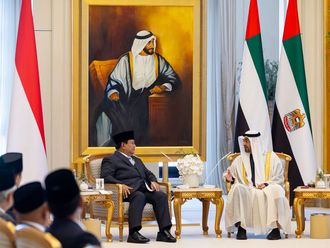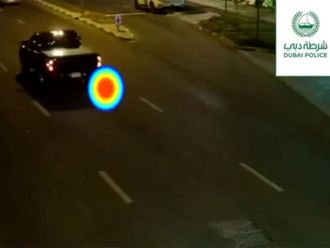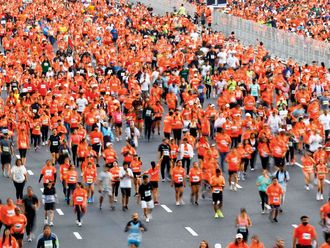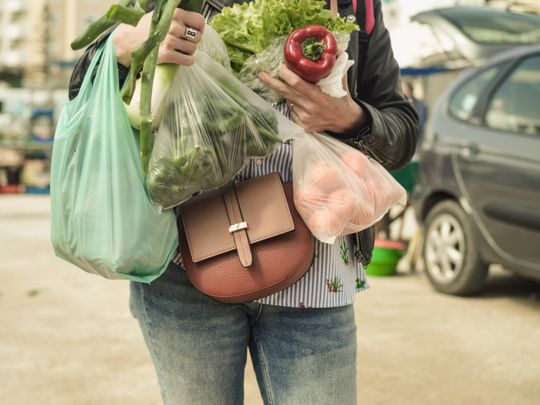
Dubai: Dubai Municipality today explained the types of shopping bags that will be charged and those that will be exempted from July 1. As announced earlier, Dubai will introduce a charge of 25 fils for single-use plastic bags, beginning July 1, with the aim of completely banning these bags in two years’ time.
The civic body also clarified that several other types of shopping bags will also be charged the same amount, considering their high environmental footprint.
Any bag less than 57 micrometres thick — including bags made of plastic, paper, biodegradable plastic, oxo-plastics and plant-based biodegradable material — will also be charged 25 fils each.
However, the policy does not include packing bags for various items, the municipality said. These are bread bags (knot bags), roll bags for vegetables, fruit, meat, fish and chicken, bags for medicines in pharmacies, laundry bags, bags for electronic gadgets, grain bags and garbage bags of different sizes and types. Any bag that is more than 57 micrometre thick will also be exempted from the tariff.
“The policy includes only single-use bags for 'carrying goods' [not packaging them],” the municipality clarified.
Dubai Municipality clarified these details and answered fresh questions in an update to the guidelines issued for the new tariff for single-use bags.
Why some alternative bags are also charged?
Regarding other single-use bags, the municipality said: “It should be noted that alternatives often have a larger environmental footprint than plastic bags, although they are easier to manage at the disposal stage and cause less environmental and health damage, provided they are used properly.”
For example, production of paper bags is also harmful to the environment and leads to the felling of large number of trees and the consumption of a lot of resources and energy. Therefore, its use also requires a payment of fees.
What is the problem with biodegradable bags?
Biodegradable plastic bags have environmental damage and therefore a 25 fils charge will apply to them as well. Biodegradable plastic bags do not completely decompose, but leave behind micro-plastics that can be consumed by the marine life we eat. “As the objective of the policy is to reduce single-use bags, plant-based single-use bags are also included under the tariff,” said the municipality.
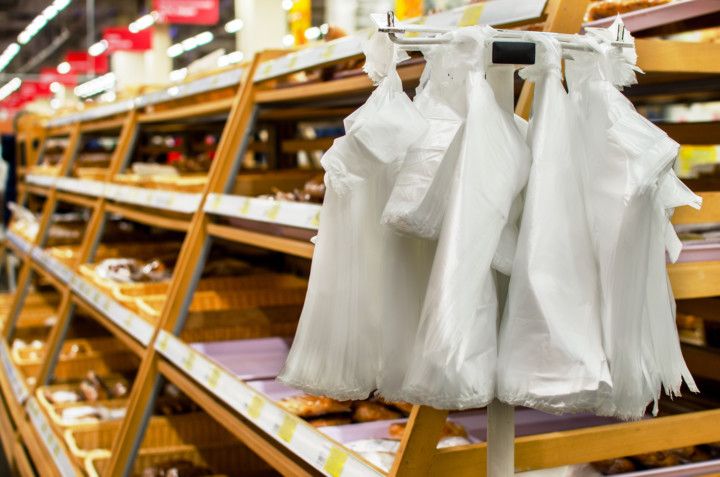
Will the decision include bags of products that are purchased online?
The policy applies to online sites as well if they use single-use bags to carry goods.
Is the charge necessary if I don’t need to buy any bag?
No. The charge is only on single-use bags for carrying goods that are taken from the store when purchasing goods.
Are there shops or activities that are exempt from paying this charge?
No, the charge applies to all stores that use single-use bags to carry goods, including, for example, retail stores, restaurants, pharmacies, e-commerce services and delivery services.
Can I bring bags and carriers to use instead of buying plastic bags from the store?
Yes, you can bring bags and carriers to use instead of buying plastic bags from the store. This is a sustainable practice that is always encouraged.
How do I report noncompliant outlets?
By registering a complaint with the consumer protection channels of the Department of Economy and Tourism in Dubai through the ”Dubai Consumer" mobile application or the website of the Consumer Rights department or through the call centre 600545555.
How can residents reduce consumption of single-use material?
According to the municipality, imposing charges is the first step to changing behaviour in the society and then reducing the amount of waste and environmental damage caused by single-use bags.
“The first step is to take care to reduce consumption in general, and reduce the use of single-use material, before addressing the issue of recycling,” it said.
This can be done by purchasing material without packaging such as vegetables and fruit and not asking for single-use cutlery and straws when buying food and installing a water filter for drinking at home, which will reduce the need to purchase single-use water bottles.
Secondly, the municipality said, it is important to sort the waste at home, separating recyclable waste such as paper, metal, plastic and glass from other household wastes, taking care to keep the recyclables clean in order to reduce their pollution, especially from food waste, which will limit the capacity of their recycling.
What are the recycling options available?
Residents interested in recycling can visit the Dubai Recycles page on the municipality’s website if they have unwanted items that they would like to dispose of in an environmentally sound manner. “For example, clothes or books or toys or household items. You can donate them to charitable organisations that are suitable. You can also recycle other items such as plastics, paper, glass, bottles, portable electronics, cartons and metal cans at the recyclable material collection centre nearest to your location,” the civic body added.





